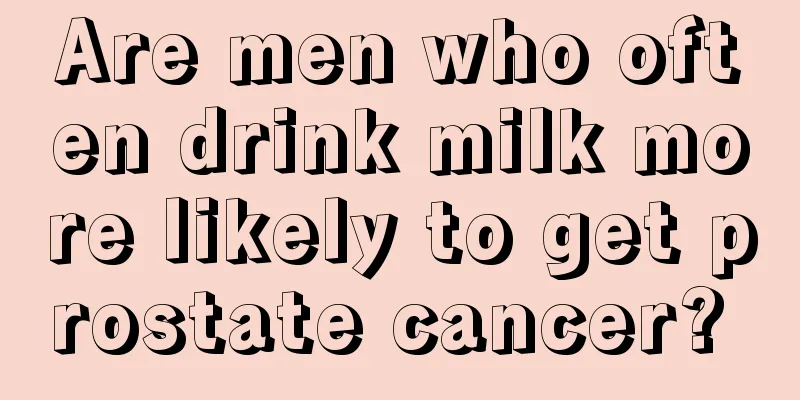Are men who often drink milk more likely to get prostate cancer?

|
Prostate cancer is a common malignant tumor of the male reproductive system. A research team in Boston, USA, conducted an 11-year follow-up survey on 20,885 American male physicians. The dairy products they consumed mainly included skim milk, whole milk and cheese. Among them, 1,012 men developed prostate cancer. After statistical analysis, it was found that compared with men who took 150 mg of calcium from dairy products every day, the concentration of 125-dihydroxyvitamin D3 (which has anti-prostate cancer effect) in the plasma of men who took 600 mg of calcium every day was significantly lower, and the risk of prostate cancer increased by 32%. After excluding the influencing factors such as age, weight, smoking, and physical exercise, it was found that men who consumed more than 2.5 servings of dairy products (each serving is equivalent to 240 ml of milk) every day had a 34% higher risk of prostate cancer than those who consumed less than 0.5 servings of dairy products. Researchers in Philadelphia, USA, have also confirmed through epidemiological surveys over the past 10 years that eating more dairy products increases the risk of prostate cancer in men. Domestic studies have also found that milk intake is significantly correlated with the incidence of prostate cancer, which may be due to the high estrogen content in some brands of milk. Fortunately, some plant compounds in fruits and vegetables have certain anti-cancer effects. Lycopene is an important carotenoid that is widely found in fruits and vegetables. Tomatoes, apricots, guavas, watermelons, papayas and red grapes all contain a lot of lycopene, with tomatoes containing the highest content. American researchers conducted a six-year follow-up survey on 46,000 men and found that 773 of them developed prostate cancer. The study found that compared with those who did not eat raw tomatoes, those who ate raw tomatoes 2-4 times a week had a 26% lower risk of developing prostate cancer. Tomato pizza and tomato sauce also had this effect. Eating lycopene directly can also reduce the risk of prostate cancer. Lycopene has the strongest antioxidant properties among natural carotenoids. It has the functions of protecting genetic material DNA (deoxyribonucleic acid), inhibiting cancer cell proliferation and regulating hormone status. Its anti-prostate cancer effect has been confirmed by a large number of studies. Therefore, in order to protect the prostate, men should drink milk slowly and not treat it as a beverage. In addition, special attention should be paid to nutritional balance and it is better to eat more tomatoes every day. |
<<: What are the tests to diagnose prostate cancer
>>: Who are the high-risk groups for prostate cancer?
Recommend
The efficacy of Cassia seed soaked in wine
Cassia seed is a very common Chinese medicinal ma...
Talk about the five major symptoms of colon cancer clinical manifestations
In our country, many patients do not understand t...
What to do if you can't pronounce the words clearly when singing
In our lives, many people like to sing, and some ...
What are the dangers of not treating pharyngitis for a long time?
People always pay attention to physical health. T...
Does ovarian tumor affect pregnancy?
Ovarian tumors can be benign or malignant. Due to...
What is the nebulization treatment for chronic pharyngitis
Patients with respiratory diseases often encounte...
What to do if your lips are too thick?
Perhaps everyone has not paid attention to our li...
What are eye bags
When it comes to the question of what are eye bag...
Does a fracture require surgery?
In fact, not every fracture requires surgery. It ...
Selenium actually has such effects
Selenium is an essential oxidant between humans a...
Let's talk about the advanced symptoms of bladder cancer
If bladder cancer is not treated in time or is no...
Why does poor sleep lead to poor memory?
Memory has a great impact on people's lives, ...
How to read the normal value of urine routine test report
Regarding the test reports of routine urine exami...
The efficacy and function of egg membrane
In fact, eggs, a common food in our daily life, a...
Four tips to stay away from stomach cancer
Gastric cancer is one of the most common tumors i...









